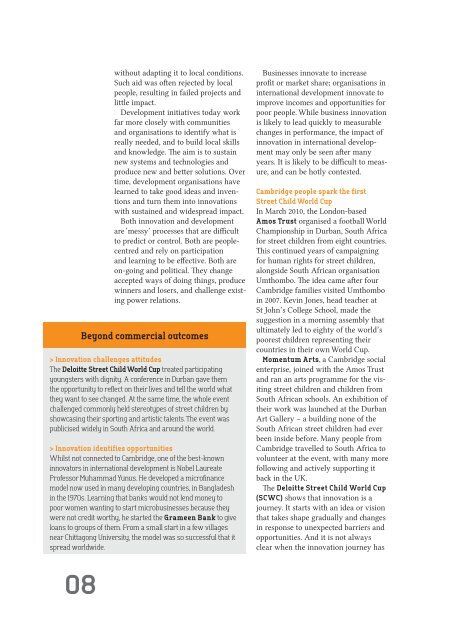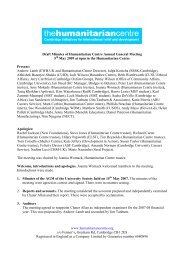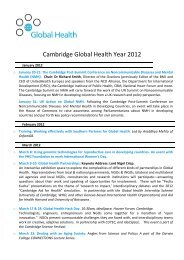Cambridge and international development - The Humanitarian Centre
Cambridge and international development - The Humanitarian Centre
Cambridge and international development - The Humanitarian Centre
You also want an ePaper? Increase the reach of your titles
YUMPU automatically turns print PDFs into web optimized ePapers that Google loves.
without adapting it to local conditions.<br />
Such aid was often rejected by local<br />
people, resulting in failed projects <strong>and</strong><br />
little impact.<br />
Development initiatives today work<br />
far more closely with communities<br />
<strong>and</strong> organisations to identify what is<br />
really needed, <strong>and</strong> to build local skills<br />
<strong>and</strong> knowledge. <strong>The</strong> aim is to sustain<br />
new systems <strong>and</strong> technologies <strong>and</strong><br />
produce new <strong>and</strong> better solutions. Over<br />
time, <strong>development</strong> organisations have<br />
learned to take good ideas <strong>and</strong> inventions<br />
<strong>and</strong> turn them into innovations<br />
with sustained <strong>and</strong> widespread impact.<br />
Both innovation <strong>and</strong> <strong>development</strong><br />
are ‘messy’ processes that are difficult<br />
to predict or control. Both are peoplecentred<br />
<strong>and</strong> rely on participation<br />
<strong>and</strong> learning to be effective. Both are<br />
on-going <strong>and</strong> political. <strong>The</strong>y change<br />
accepted ways of doing things, produce<br />
winners <strong>and</strong> losers, <strong>and</strong> challenge existing<br />
power relations.<br />
Beyond commercial outcomes<br />
> Innovation challenges attitudes<br />
<strong>The</strong> Deloitte Street Child World Cup treated participating<br />
youngsters with dignity. A conference in Durban gave them<br />
the opportunity to reflect on their lives <strong>and</strong> tell the world what<br />
they want to see changed. At the same time, the whole event<br />
challenged commonly held stereotypes of street children by<br />
showcasing their sporting <strong>and</strong> artistic talents. <strong>The</strong> event was<br />
publicised widely in South Africa <strong>and</strong> around the world.<br />
> Innovation identifies opportunities<br />
Whilst not connected to <strong>Cambridge</strong>, one of the best-known<br />
innovators in <strong>international</strong> <strong>development</strong> is Nobel Laureate<br />
Professor Muhammad Yunus. He developed a microfinance<br />
model now used in many developing countries, in Bangladesh<br />
in the 1970s. Learning that banks would not lend money to<br />
poor women wanting to start microbusinesses because they<br />
were not credit worthy, he started the Grameen Bank to give<br />
loans to groups of them. From a small start in a few villages<br />
near Chittagong University, the model was so successful that it<br />
spread worldwide.<br />
Businesses innovate to increase<br />
profit or market share; organisations in<br />
<strong>international</strong> <strong>development</strong> innovate to<br />
improve incomes <strong>and</strong> opportunities for<br />
poor people. While business innovation<br />
is likely to lead quickly to measurable<br />
changes in performance, the impact of<br />
innovation in <strong>international</strong> <strong>development</strong><br />
may only be seen after many<br />
years. It is likely to be difficult to measure,<br />
<strong>and</strong> can be hotly contested.<br />
<strong>Cambridge</strong> people spark the first<br />
Street Child World Cup<br />
In March 2010, the London-based<br />
Amos Trust organised a football World<br />
Championship in Durban, South Africa<br />
for street children from eight countries.<br />
This continued years of campaigning<br />
for human rights for street children,<br />
alongside South African organisation<br />
Umthombo. <strong>The</strong> idea came after four<br />
<strong>Cambridge</strong> families visited Umthombo<br />
in 2007. Kevin Jones, head teacher at<br />
St John’s College School, made the<br />
suggestion in a morning assembly that<br />
ultimately led to eighty of the world’s<br />
poorest children representing their<br />
countries in their own World Cup.<br />
Momentum Arts, a <strong>Cambridge</strong> social<br />
enterprise, joined with the Amos Trust<br />
<strong>and</strong> ran an arts programme for the visiting<br />
street children <strong>and</strong> children from<br />
South African schools. An exhibition of<br />
their work was launched at the Durban<br />
Art Gallery − a building none of the<br />
South African street children had ever<br />
been inside before. Many people from<br />
<strong>Cambridge</strong> travelled to South Africa to<br />
volunteer at the event, with many more<br />
following <strong>and</strong> actively supporting it<br />
back in the UK.<br />
<strong>The</strong> Deloitte Street Child World Cup<br />
(SCWC) shows that innovation is a<br />
journey. It starts with an idea or vision<br />
that takes shape gradually <strong>and</strong> changes<br />
in response to unexpected barriers <strong>and</strong><br />
opportunities. And it is not always<br />
clear when the innovation journey has<br />
08





